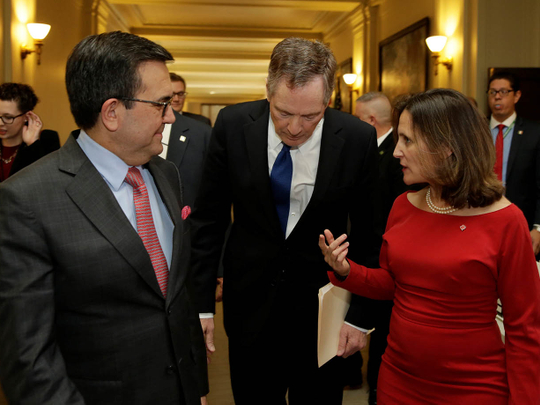
Washington: Canada, the United States and Mexico on Tuesday pushed into 2018 the current talks to overhaul the North American Free Trade Agreement, saying significant disagreements remained among the three sides.
At a press conference in Washington, representatives of the three governments exchanged mutual accusations of intransigence — leaving the success of the talks, and the future of the 23-year-old trade pact, in doubt.
President Donald Trump has repeatedly threatened to scrap the landmark regional trade pact, describing it as a “disaster” that resulted in the export of US jobs.
After four rounds of talks squeezed into a two month period, negotiators will now allow a month-long cooling-off period before returning to the bargaining table in Mexico on November 17.
But the apparent deadlock in the talks underscored how a keystone of regional trade — US trade with Mexico has tripled since 1993 to $1.2 trillion — was now in jeopardy.
Canadian Foreign Minister Chrystia Freeland accused the United States on Tuesday of “a winner-take-all” mindset that sought to undermine the agreement and she took aim at US proposals on rules of origin for duty-free trade in autos and for rules on access to markets for government procurement contracts.
“We’ve also seen a series of unconventional proposals in critical areas of the negotiations that make our work much more challenging,” Freeland told a joint press conference in Washington.
Likewise, Mexican Finance Minister Ildefonso Guajardo Villarreal suggested Mexico had stretched as far as it could in making concessions.
“We must all understand that we have limits,” he said. “We must ensure that the decisions that we make today do not come back to haunt us tomorrow.”
US Trade Representative Robert Lighthizer accused Mexico and Canada of being unwilling to relinquish unfair advantages that he said broadened the $500 billion US global trade deficit.
“Frankly, I am surprised and disappointed by the resistance to change from our negotiating partners,” Lighthizer said.
“As difficult has this been, we have seen no indication that our partners are willing to make any changes that will result in a rebalancing and a reduction in these huge trade deficits.”
“Countries are reluctant to give up unfair advantage,” said Lighthizer.
“But the president has been clear that if we are going to have an agreement going forward it must be fair to American businesses and workers that employ our people at home.”
Headed for a breakdown?
The US currently has a trade deficit with Mexico of greater than $60 billion but according to Freeland, the Canadian foreign minister, the US currently enjoys a small surplus with Canada of about $8 billion out of more than $630 billion in annual trade.
Yet at a separate news conference on Tuesday, she said the United States had proposed limiting its Nafta partners’ access to US government procurement contracts.
“The United States has put forward a proposal that according to our calculations would give Canada and Mexico less access to the US government procurement market than Bahrain currently enjoys,” she said.
Begun at the behest of the Trump administration, the new negotiations have set nerves on edge among market participants, with several US proposals likely to face stiff opposition from US industry and lawmakers.
US industry has reacted harshly to the trade talks. The US Chamber of Commerce has said the US bargaining position encourages other countries to strike trade bargains that bypass the United States and threatens to reduce US access to export crucial markets.
Scott Miller, a trade expert at the Centre for Strategic and International Studies and a member of an advisory committee for the State Department, told AFP the talks appeared headed for collapse because certain US proposals were non-starters for US industry and for lawmakers.
These included requiring US-made content in autos and auto parts that cross the Mexican and Canadian borders duty-free as well as weakening or undoing dispute settlement provisions.
“Either trading partners reject them and the talks break down, or Congress rejects them and Nafta 2.0 doesn’t happen,” Miller said.
“This is an opportunity, if the Congress will only take it, to involve themselves in what’s going and put these negotiations on a path that isn’t headed for a breakdown.”












